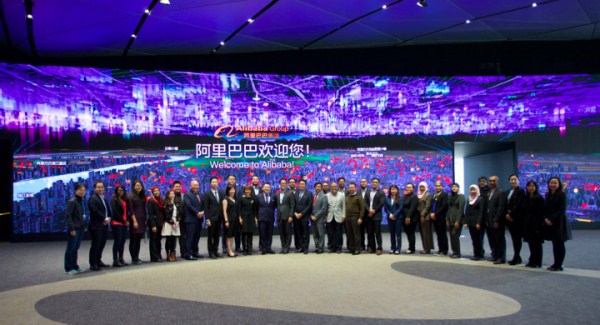
The Malaysian delegates pose for a group photo at Alibaba's Xixi Park in Hangzhou, the capital of Zhejiang province, on March 4. [Photo/zjol.com.cn]
A 30-member Malaysian delegation from over 20 government departments visited the Xixi Park of Alibaba Group in Hangzhou, capital of Zhejiang province, on March 4, in a bid to seek lessons from Chinese experiences with the digital economy and empower the digital transformation of the country.
In 2017, China's e-commerce giant Alibaba group inked an agreement with the Malaysian government to jointly build a Digital Free Trade Zone (DFTZ) in Malaysia, Alibaba's first overseas Electronic World Trade Platform (eWTP) facility aiming to promote the growth of small and medium enterprises involved in e-commerce.
"Digital trade represents the future. We not only hope to develop warehousing logistics, trade and commerce through eWTP, but more importantly, the new way of doing business will bring new vitality and opportunities to Malaysia," Malaysia's International Trade and Industry Minister Darell Leiking told the reporters.
He hoped that through the trip, Malaysian government departments at all levels can have a better understanding of the eWTP and grow into a trainer from a trainee by bringing back the seeds of China's digital experiences.

Malaysian delegates attend e-commerce training at Alibaba's Xixi Park in Hangzhou, the capital of Zhejiang province, on March 4. [Photo/zjol.com.cn]
The eWTP has provided Malaysia with a global vision and an ability to embrace globalization, said Dato' Ng Wan Peng, chief operating officer of Malaysia Digital Economy Corporation, adding that as more and more Malaysians are now engaging with cross-border e-commerce trade, eWTP has become an important driving force for the country in stimulating export policies.
According to the latest figures, the added value of Malaysia's e-commerce industry has played a bigger role in the national GDP from 2010 to 2017, with an annual growth of 12.5 percent. It is expected that the digital economy would contribute to 20 percent of Malaysia's GDP by 2020.

